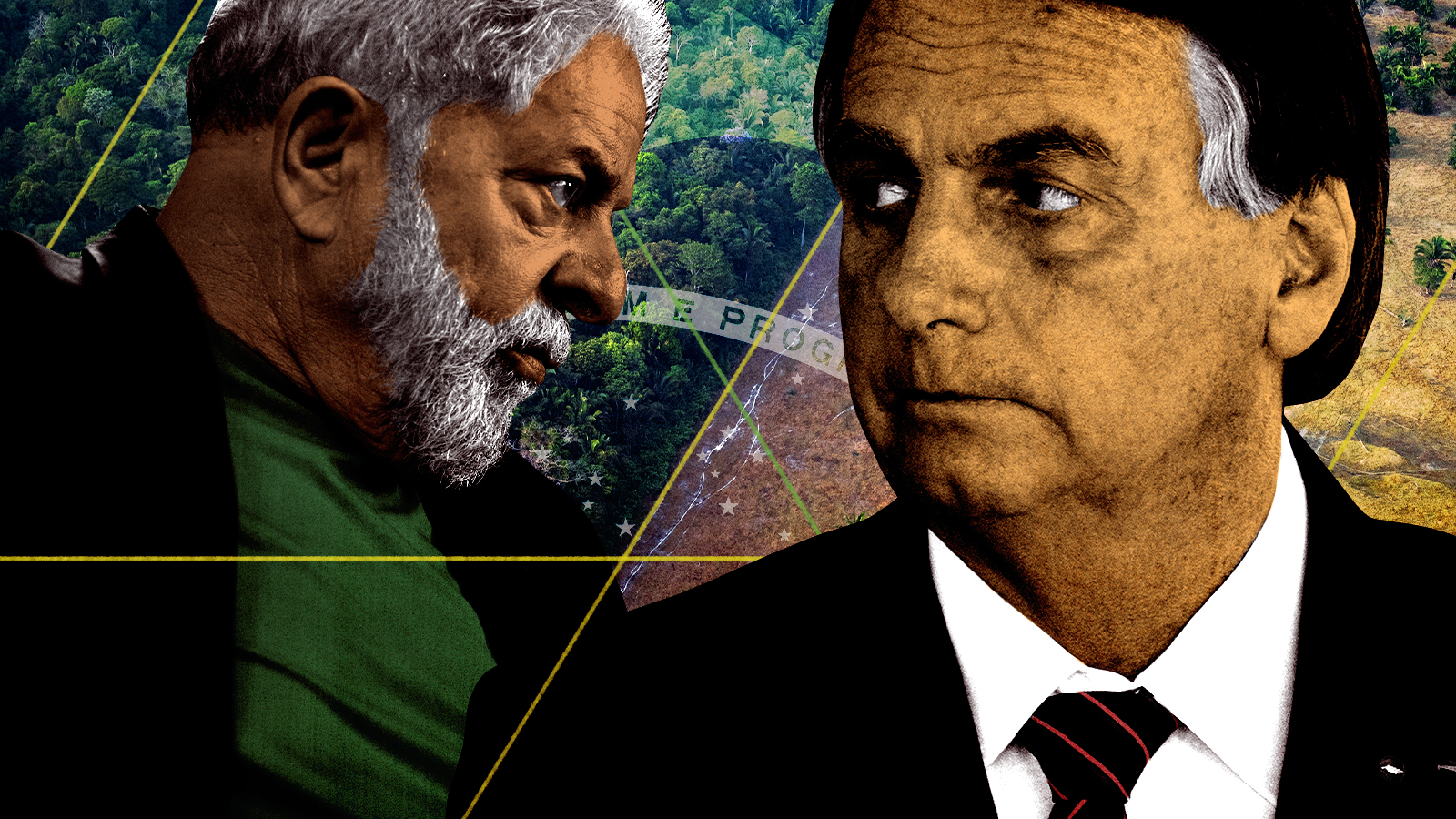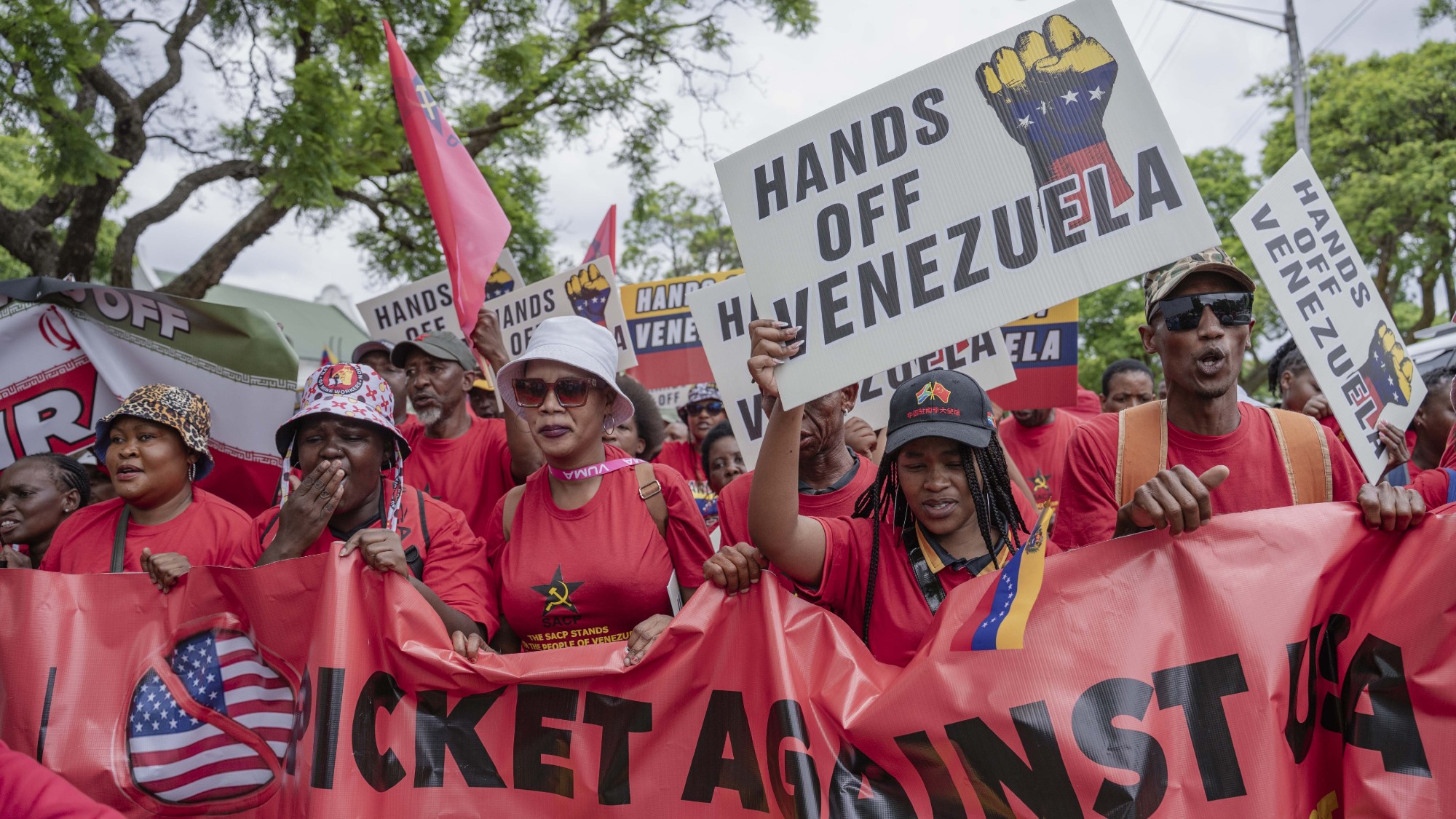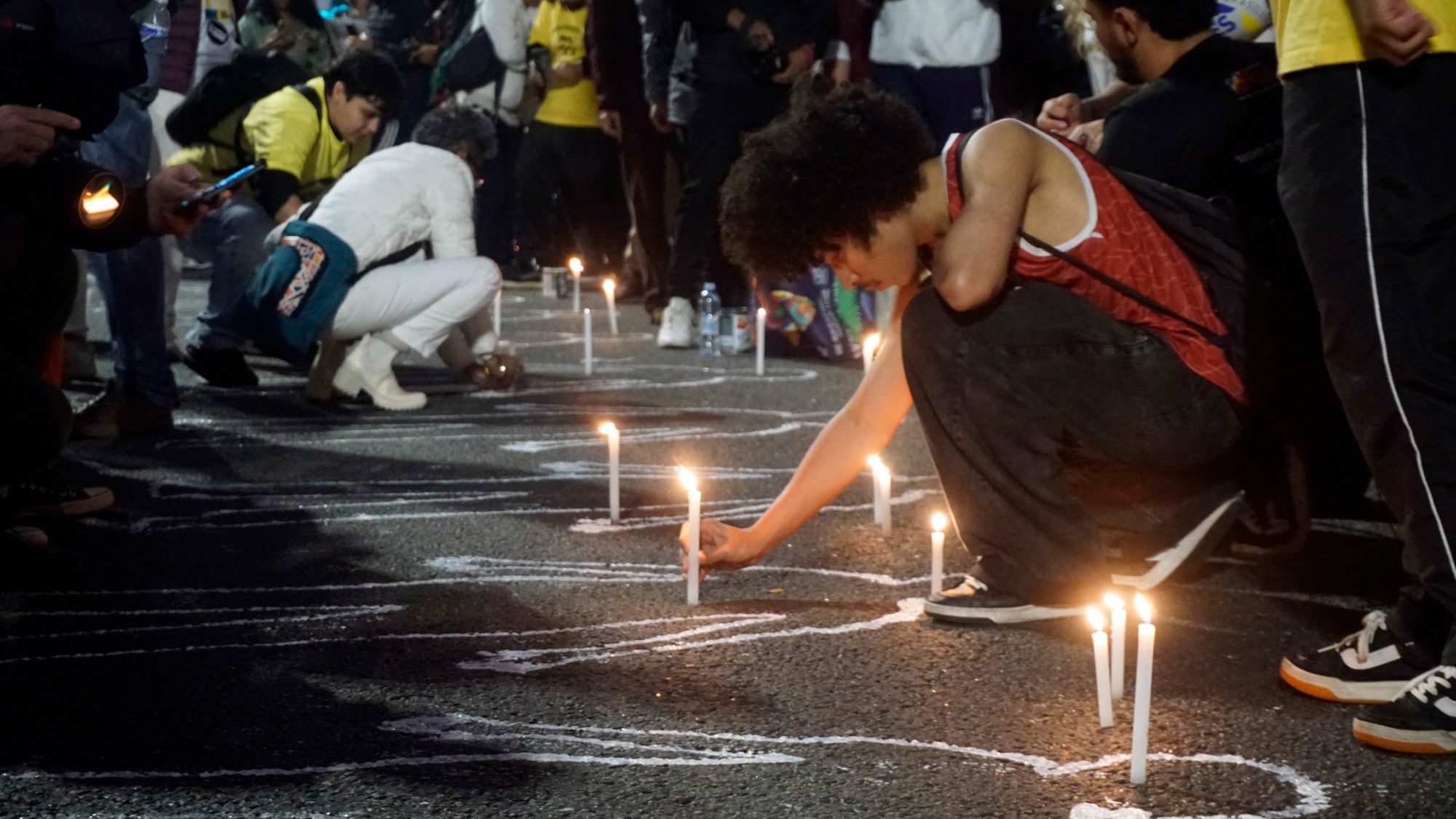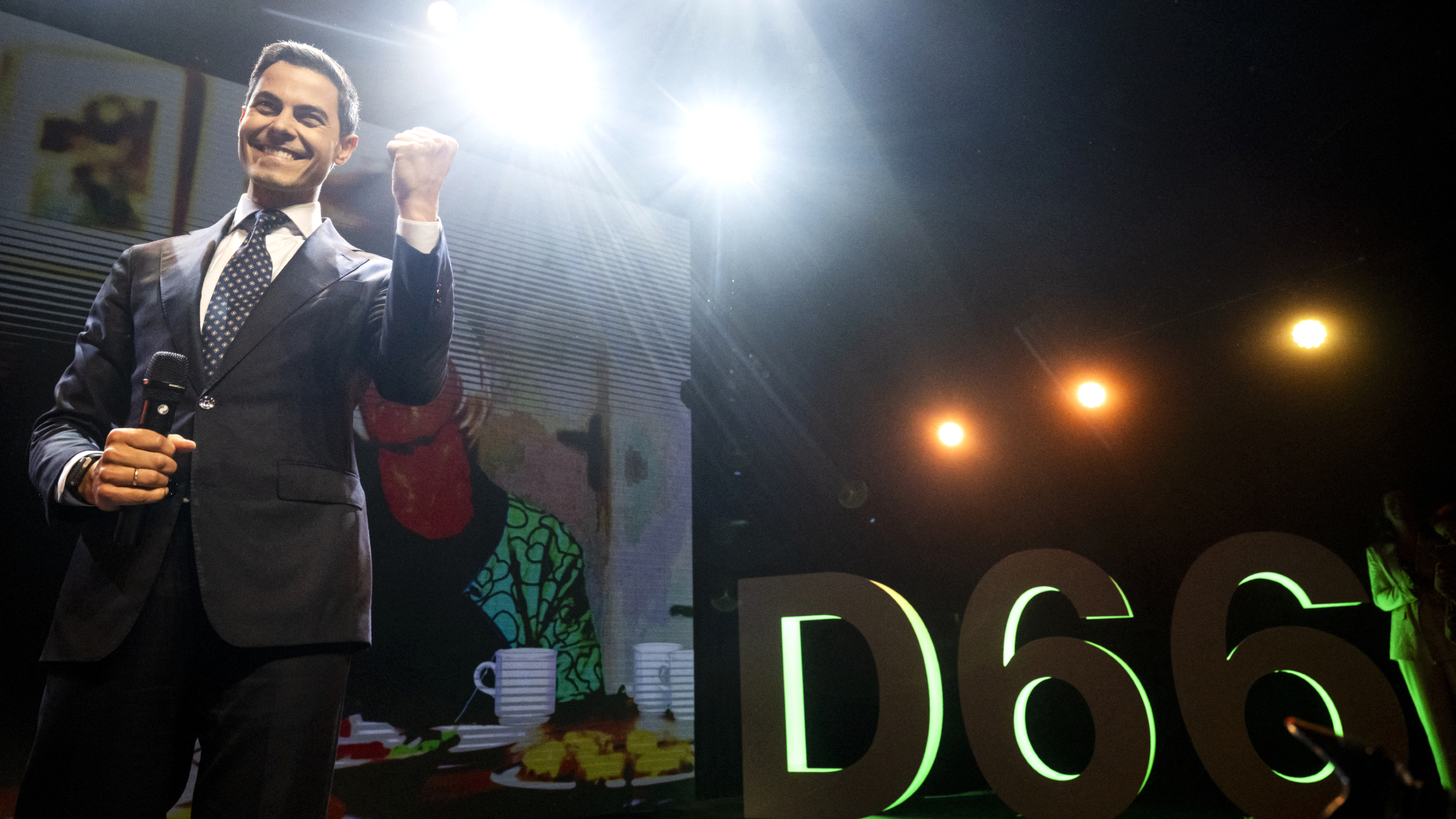Brazil's election: A clash of presidents
Lula has officially been declared the winner. What does that mean for Brazil?


A free daily email with the biggest news stories of the day – and the best features from TheWeek.com
You are now subscribed
Your newsletter sign-up was successful
On Oct. 30, Brazilians voted for their next president, casting a ballot either for incumbent President Jair Bolsonaro or former President Luiz Inácio Lula da Silva. Here's everything you need to know:
The latest:
Lula was declared the winner of the Brazilian election on Oct. 30 in an extremely close race, claiming victory with a margin of 50.9 percent to 49.1 percent, Reuters reports. Bolsanaro has become the first incumbent in 34 years to not gain a second term. Lula's win also removes the far-right government from Brazil.
As previously expected, Bolsanaro has been silent since his loss and has yet to concede, The New York Times reports. He repeatedly cast doubt on Brazil's voting machines and alleged that the country's left was rigging the vote, a claim which has been disproved a number of times. Despite Bolsanaro's silence, many far-right officials accepted the defeat, including Carla Zambelli, a far-right congresswoman who tweeted, "The dream of freedom of more than 51 million Brazilians lives on" after the election.
The Week
Escape your echo chamber. Get the facts behind the news, plus analysis from multiple perspectives.

Sign up for The Week's Free Newsletters
From our morning news briefing to a weekly Good News Newsletter, get the best of The Week delivered directly to your inbox.
From our morning news briefing to a weekly Good News Newsletter, get the best of The Week delivered directly to your inbox.
In the wake of Lula's victory, there were celebrations in the streets of Rio de Janeiro and São Paulo, The Washington Post reports. "I will govern for 215 million Brazilians, and not just for those who voted for me," Lula said in his victory speech. "There are not two Brazils. We are one country, one people, one great nation."
Who were the candidates?
While there were initially 11 candidates in the running, the election winnowed to a battle between Jair Bolsonaro and Luiz Inácio Lula da Silva, known as Lula. Over 80 percent of Brazilian voters voted for one of the two candidates.
Current president and incumbent candidate Bolsonaro has had a rather turbulent presidency thus far. Bolsonaro is a right-wing populist who took office in 2019. When he assumed the role, he vowed to "restore order" and actively denounced corruption and crime. The media often referred to Bolsonaro as the "Trump of the tropics" due to his conservative ideologies and strong stance against leftists. His presidency was marked by reduced gun regulation, expanded deforestation of the Amazon rainforest, and corruption scandals. One of the defining moments of his presidency was the COVID-19 pandemic, which came a year into his term. Bolsonaro denied the dangers of COVID, calling it a "little flu," which ultimately led to Brazil having the second-highest death toll in the world as of Aug. 2022, the Buenos Aires Times reports.
Bolsonaro's competition was Lula. Lula was elected president in 2002 after running four times. He became the first leftist leader in Brazil in nearly a half-century and served two terms. He left office with a very high approval rating for an exiting president, the BBC reports. During his terms, Lula funded large-scale social programs and increased the minimum wage. In July 2017, Lula was caught in a scandal and sentenced to nine years in prison for corruption, charges which he fervently denied. In November 2019, new evidence found that the judge working the case may not have been impartial, leading to Lula's release. He promptly returned to the political stage.
A free daily email with the biggest news stories of the day – and the best features from TheWeek.com
Brazil has no limit to the number of terms a person can serve, but they can only serve two consecutive terms at a time.
What had the polls looked like before the election?
The election takes place in two rounds — if no candidate gets 50 percent of the votes in round one, the top two candidates compete in a run-off election. Round one of the election took place on Oct. 2. Leading up to the election, Lula continued to gain a lead over Bolsonaro in the polls, showing Lula at 48 percent of the vote and Bolsonaro at 31 percent just days before the election, reported Reuters. Given the numbers, the polls suggested that Lula had the potential to win the election in the first round alone.
Concerned about the data, the incumbent made a variety of strategic moves to help push polls in his direction. For one, he attended the U.N. General Assembly this month and gave a speech touting the wins of his administration in an effort to garner support. Bolsonaro has also attempted to openly cast doubt on the legitimacy of the election. His party released a document alleging that there are a group of government contractors with "absolute power to manipulate election results without leaving a trace." The released document contained no evidence and was immediately rejected by Brazil's electoral authority, the Times reports. The nation's Supreme Court is now investigating Bolsonaro's party for fraud.
Bolsonaro also suggested that he would not accept the outcome of the election in the event of his loss. He stated that he would accept the results if they are "clean and transparent," however his discrediting of the election suggests that he doesn't perceive the election as either, the Economist reported. Many have drawn similarities between Bolsonaro and Trump's election-denying methods, further amplified by the fact that Trump previously referred to Bolsonaro as his "number-one ally."
When Oct. 2 rolled around, Bolsonaro got more votes than polls predicted, garnering 43 percent of the vote, while Lula garnered 48 percent. Since neither candidate hit the 50 percent threshold, round two of the election was set for Oct. 30 with only the two candidates in the running. The gap in numbers between the candidates has also decreased: Previously, polls by the Economist suggested that Lula would likely win by a margin of 57 percent to 43 percent. The polls then became closer showing Lula winning 52 percent to 48 percent.
However, even with Lula's win, Bolsonaro's influence will likely not disappear. Millions of Brazilians would believe that Bolsonaro's loss means that the election was rigged, the Times writes. Reportedly three out of four Bolsonaro supporters do not have full faith in voting machines. In anticipation of the election, Brazil's Supreme Court has increased security and the military is preparing for possible unrest, even citing a possible Jan. 6 equivalence in the country.
What was at stake?
The biggest stakeholder in this election was the Amazon rainforest. Many media outlets deemed this the election to determine the fate of the Amazon because of how much either candidate would change the trajectory of its management. Under Bolsonaro, deforestation sharply increased. When he was elected, he favored the agribusiness industry and consequently removed enforcement measures, cut spending, fired experts from science and environmental agencies, and tried to weaken Indigenous land rights, Vox reports. By 2021, Amazon deforestation rose 73 percent above 2018 levels. These levels are expected to rise even further if Bolsonaro stayed in office, according to Reuters.
On the other hand, during Lula's presidency in 2003, he coordinated with government agencies to reduce deforestation by 70 percent and advocated for climate change mitigation. In his campaign, Lula also emphasized reducing deforestation and eliminating illegal mining in the rainforest, Grist reports. An analysis shows that Bolsonaro's loss could cut deforestation by approximately 89 percent.
This could be the election's most pressing issue. The Amazon is home to nearly 40,000 plant species, 427 kinds of mammals, 1,300 birds, 378 reptiles, 400 amphibians, and 3,000 freshwater fish. Excessive deforestation could cause a runaway reaction, transforming the rainforest into a savannah-like ecosystem, unsuitable for most Amazonian species. The tipping point for the reaction is predicted to be when approximately 20 to 25 percent of the forest is gone. Currently, approximately 17 percent of the Amazon is gone. The outcome of Brazil's election could very well determine the future of the forest.
Update Oct. 31, 2022: This story has been updated to reflect the results of the election.
Devika Rao has worked as a staff writer at The Week since 2022, covering science, the environment, climate and business. She previously worked as a policy associate for a nonprofit organization advocating for environmental action from a business perspective.
-
 The environmental cost of GLP-1s
The environmental cost of GLP-1sThe explainer Producing the drugs is a dirty process
-
 Greenland’s capital becomes ground zero for the country’s diplomatic straits
Greenland’s capital becomes ground zero for the country’s diplomatic straitsIN THE SPOTLIGHT A flurry of new consular activity in Nuuk shows how important Greenland has become to Europeans’ anxiety about American imperialism
-
 ‘This is something that happens all too often’
‘This is something that happens all too often’Instant Opinion Opinion, comment and editorials of the day
-
 Japan’s Takaichi cements power with snap election win
Japan’s Takaichi cements power with snap election winSpeed Read President Donald Trump congratulated the conservative prime minister
-
 How realistic is the Democratic plan to retake the Senate this year?
How realistic is the Democratic plan to retake the Senate this year?TODAY’S BIG QUESTION Schumer is growing bullish on his party’s odds in November — is it typical partisan optimism, or something more?
-
 A running list of US interventions in Latin America and the Caribbean after World War II
A running list of US interventions in Latin America and the Caribbean after World War IIin depth Nicolás Maduro isn’t the first regional leader to be toppled directly or indirectly by the US
-
 The billionaires’ wealth tax: a catastrophe for California?
The billionaires’ wealth tax: a catastrophe for California?Talking Point Peter Thiel and Larry Page preparing to change state residency
-
 Bari Weiss’ ‘60 Minutes’ scandal is about more than one report
Bari Weiss’ ‘60 Minutes’ scandal is about more than one reportIN THE SPOTLIGHT By blocking an approved segment on a controversial prison holding US deportees in El Salvador, the editor-in-chief of CBS News has become the main story
-
 Massacre in the favela: Rio’s police take on the gangs
Massacre in the favela: Rio’s police take on the gangsIn the Spotlight The ‘defence operation’ killed 132 suspected gang members, but could spark ‘more hatred and revenge’
-
 Has Zohran Mamdani shown the Democrats how to win again?
Has Zohran Mamdani shown the Democrats how to win again?Today’s Big Question New York City mayoral election touted as victory for left-wing populists but moderate centrist wins elsewhere present more complex path for Democratic Party
-
 Dutch center-left rises in election as far-right falls
Dutch center-left rises in election as far-right fallsSpeed Read The country’s other parties have ruled against forming a coalition
